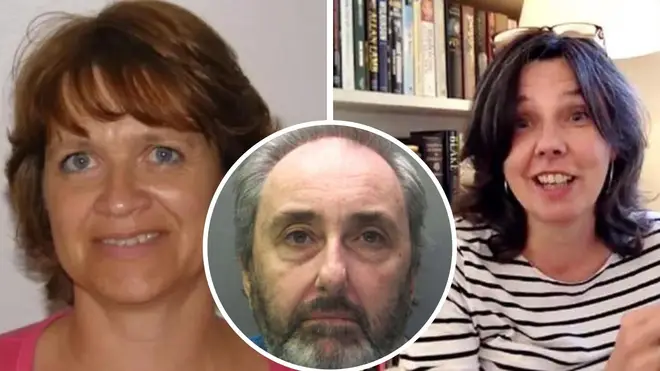
Paul Brand 3pm - 6pm
9 February 2022, 15:31 | Updated: 9 February 2022, 23:10

Ian Stewart to spend rest of life in prison after murders of wife then fiancee
This is the moment double killer Ian Stewart, who was convicted of killing his fiancee Helen Bailey, was arrested for murdering his wife six years earlier.
Stewart has been given a whole-life sentence for murdering his first wife, Diane Stewart, six years before he went on to murder his fiancee, children's book author Helen Bailey.
The 61-year-old denied murdering his 47-year-old wife Mrs Stewart in 2010 but jurors at Huntingdon Crown Court rejected his account that he found her collapsed having suffered an epileptic fit at their home in Bassingbourn, Cambridgeshire.
Prosecutors said it is most likely Mrs Stewart's death was caused by a prolonged restriction to her breathing from an outside source, such as smothering or a neck hold.
Detectives began investigating the death of Ms Stewart after he was convicted of killing children's author Helen Bailey in 2017.
He killed the 51-year-old in 2016 and dumped her body in the cesspit of the £1.5 million home they shared in Royston in Hertfordshire.
A trial at St Albans Crown Court heard it was most likely she was suffocated while sedated by drugs, and Stewart was found guilty of her murder in 2017.
Detectives then investigated the death of Stewart's first wife, whose death was recorded at the time as Sudden Unexplained Death in Epilepsy (SUDEP).
Read more: Kurt Zouma’s cats rescued by RSPCA and he’s fined ‘£250,000’ as police probe kicking video
Read more: Author Helen Bailey's killer to die behind bars for murdering first wife 6 years earlier

On Wednesday a jury of five men and seven women at Huntingdon Crown Court found Stewart guilty of her murder, and he was handed a whole-life sentence by the judge.
Police have since released video of Stewart's arrest, where he is seen saying "you're joking" to the officer, adding: "Oh f*** off".
Stewart had claimed in court, as his two sons listened to his evidence, that he had returned from the supermarket to the family home in Bassingbourn, Cambridgeshire, and found his wife collapsed in the garden.
He said he thought she had suffered an epileptic fit.
Mrs Stewart had not had an epileptic fit for 18 years and took daily medication, jurors were told, with consultant neurologist Dr Christopher Derry estimating that her risk of having a fatal epileptic seizure was about one in 100,000.
During a 999 call Stewart was instructed to perform CPR on his wife and said he was doing so, but paramedic Spencer North, who attended the scene, said there "didn't seem to be any effective CPR".
Mrs Stewart's death was not treated as suspicious at the time and, while a post-mortem examination was carried out, it was not a forensic post-mortem.
As part of the police investigation, following Stewart's 2017 murder conviction, consultant neuropathologist Professor Safa Al-Sarraj was asked to examine preserved parts of Mrs Stewart's brain, which had been donated to medical science.
Prof Al-Sarraj said there was evidence that Mrs Stewart's brain had suffered a lack of oxygen prior to her death, and he estimated that this happened over a period of 35 minutes to an hour.
Read more: Boris forced to defend new partygate photo showing him near open bubbly bottle at No10
Read more: Pictured: Man stabbed to death in London as he went out with his girlfriend to buy milk
Prosecutor Stuart Trimmer QC said her death was "most likely caused by a prolonged restriction to her breathing from an outside source", such as smothering or a neck hold.
Home Office pathologist Dr Nat Cary described SUDEP as a "diagnosis of exclusion", adding that "an equal diagnosis of exclusion is having been put into such a state by some covert means - smothering or interfering with the mechanics of breathing or some kind of drug use".
The court heard that full toxicology was not carried out as part of the 2010 routine post-mortem examination, and nor was a neck dissection.
Dr Cary said that, as in the case of Mrs Stewart, there was "no injury that was visible" in the case of Ms Bailey, who was in the cesspit for three months before she was found.
The court heard that Stewart received £96,607.37 after his wife's death, in the form of £28,500.21 from a life insurance policy and the rest from bank accounts.
Both of the couple's sons were out on the day of their mother's death, with then 15-year-old Oliver at school and Jamie, then 18, taking his driving test.
Jamie Stewart had told the court that he recalled "raised voices... between my mother and father" when he was at home on study leave for A-levels the week his mother died.
In a joint statement released through police, Jamie and Oliver Stewart said: "Our Mum was amazing.
"All the people we have spoken to and things we have heard since her death have only enhanced this feeling.
"We were privileged to have a wonderful caring upbringing and we were supported through all the activities and hobbies that we undertook.
"It's been really upsetting the last six years to have to recall the events of the toughest time of our life.
"We now look forward to recalling the many happy moments we had growing up as a family.
"At this extremely difficult time, we wish for our privacy to be respected."